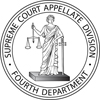Overview of the Appellate Division
The Appellate Division of the New York State Supreme Court is the State's intermediate appellate
court. The Appellate Division has the power to review issues of both law and fact in civil and
criminal matters. The Appellate Division hears appeals from the State's trial courts, including
Supreme Court, County Court, Family Court, Surrogate's Court and the Court of Claims. Decisions
of the Appellate Division are appealable to the New York State Court of Appeals, but the vast majority
of appellate practice occurs at the Appellate Division level. In addition to appeals, the Appellate
Division hears proceedings commenced against bodies or officers, either originally commenced at the
Appellate Division or transferred to the Appellate Division by order of the Supreme Court.
The Appellate Division was created by the Constitution of 1894, and it is divided into four Judicial
Departments. The Fourth Judicial Department consists of the Fifth, Seventh and Eighth Judicial Districts,
and includes 22 counties located in Central and Western New York. Geographically, the Fourth Judicial
Department extends from the St. Lawrence River in the north to the Pennsylvania border in the south
and from the Mohawk Valley in the east to Lake Erie and the Province of Ontario to the west.
County Courthouses in Fourth Department
The Justices of the Appellate Division are appointed to the Court by the Governor from the ranks of
Supreme Court Justices. The Justices of the Supreme Court are elected to 14-year terms in elections
held in each of the Judicial Districts. At full complement, 12 Justices sit on the Appellate Division,
Fourth Department.
Each year, the Court determines approximately 2,000 appeals and proceedings and 5,000 motions and
applications. The Court convenes for a term nine times during the calendar year. During seven of those
terms, each of which is approximately 10 days in length, the Court hears arguments of appeals and proceedings.
During the Court's June term, matters are considered on submission only. In August, the Court convenes
to hear appeals brought pursuant to the Election Law. Motions are returnable before the Court on the
first business day of each week.
In addition, at special sessions of Court held twice each year, and on certain days during regularly scheduled
terms of Court, the Court admits to practice new attorneys. The Court also has jurisdiction over the
imposition of attorney discipline and has oversight over the Attorney Grievance Committees. The Court
convenes to hear attorney disciplinary matters on the second Tuesday of each scheduled term.
Centennial Report 1896 - 1996: Appellate Division, Fourth Department
